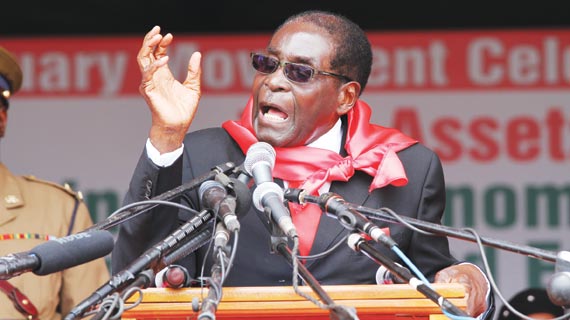
SECURITY chiefs embroiled in the fight to control Mjingwe Ranch in Mwenezi have defied the Zanu PF politburo directive to stay away from the wildlife conservancy.
MOSES MATENGA STAFF REPORTER
The senior army and police officials have threatened to evict white owner Darryl Collett, who is in a partnership with local traditional chiefs.
Collett, who owns Mjingwe Ranch with South African investor Alastair Forsyth and local communities through Chiefs Mazetese and Maranda, has reportedly fled to Bulawayo for his safety.
This came hardly a week after Guruve farmer Malcom Francis and his daughter Catherine were savagely attacked by unknown assailants at their farm. They later succumbed to injuries.
The invasion by police Assistant Commissioner Elliot Muswita and Brigadier General Josphat Kudumba’s group was in direct defiance to President Robert Mugabe’s order recently when he attacked the greedy security elites during a special Zanu PF politburo meeting.
The group also includes army Captain Solomon Ndlovu, headman Peterson Mhizha Mudumo, Raphael Shoko and Finger Tapera.
Informed sources told our sister paper NewsDay that following the invasion by the security chiefs, who recently demanded $500 000 from Collett for him to avoid eviction, some 1 000 villagers from the local community gathered to protest against them.
- Chamisa under fire over US$120K donation
- Mavhunga puts DeMbare into Chibuku quarterfinals
- Pension funds bet on Cabora Bassa oilfields
- Councils defy govt fire tender directive
Keep Reading
It is understood that the 1 000 restive crowd that had gathered at the ranch was calmed down by Masvingo Provincial Affairs minister Kudakwashe Bhasikiti.
Although Bhasikiti, who was tasked by the Zanu PF politburo to ensure all top party officials adhered to the directive by end of this month, said he had not gone to the ranch “personally”, he confirmed the disturbances.
He said he would engage Zimparks for a report on the disturbances and ensure order was restored.
“I didn’t go there myself. I am awaiting a full written report and I am yet to get one,” Bhasikiti said.
“They called and said there were disturbances, but I will make sure parks officials tell us what is happening there.
“We will not work on hearsay. In government we work on clear policies.
“If an order is given, it has to be followed by all Zimbabweans and those who can’t will be defying the government, but on this one, the politburo decision is supposed to be ratified by Cabinet so that decision was waiting to come through Cabinet.”
It is understood that the service chiefs brought a “document” which they wanted to use to force Collet and the chiefs to sign, forcing the farmer to flee to Bulawayo.
Collet and the service chiefs were not immediately available for comment on the matter.
But those close to the developments said poachers had been arbitrarily slaughtering wildlife in the ranch since Saturday.
“More than 1 000 people gathered from the community in support of the chiefs and the owners. Among the 1 000 was minister Bhasikiti,” the source said.
“The invaders are poaching in the ranch.
“The service chiefs had gone to the farm to evict Collett as a result of the newspaper article. They had gone there with army assistance.”
The security chiefs last week reportedly demanded $500 000, failure of which they said they would evict Collett.
The money, according to the group, was supposed to be part of their “shareholding dividends” from the wildlife farm from the time they were given their offer letters.
The offer letters have, however, been revoked following Mugabe’s directive.
Muswita yesterday confirmed the disturbances, but refused to give details.
He referred all questions to police spokesperson Charity Charamba or her deputy Chief Superintendent Paul Nyathi who were not available.
The settlers – armed with a 25-year lease from the Zimbabwe Parks and Wildlife Management Authority (Zimparks) – demanded through their lawyers Chuma, Gurajena and Partners that the Mjingwe owners vacate the farm by May 19.
The ranch has a Zimbabwe Investment Authority certificate, which means it is protected under the country’s investment policies.










